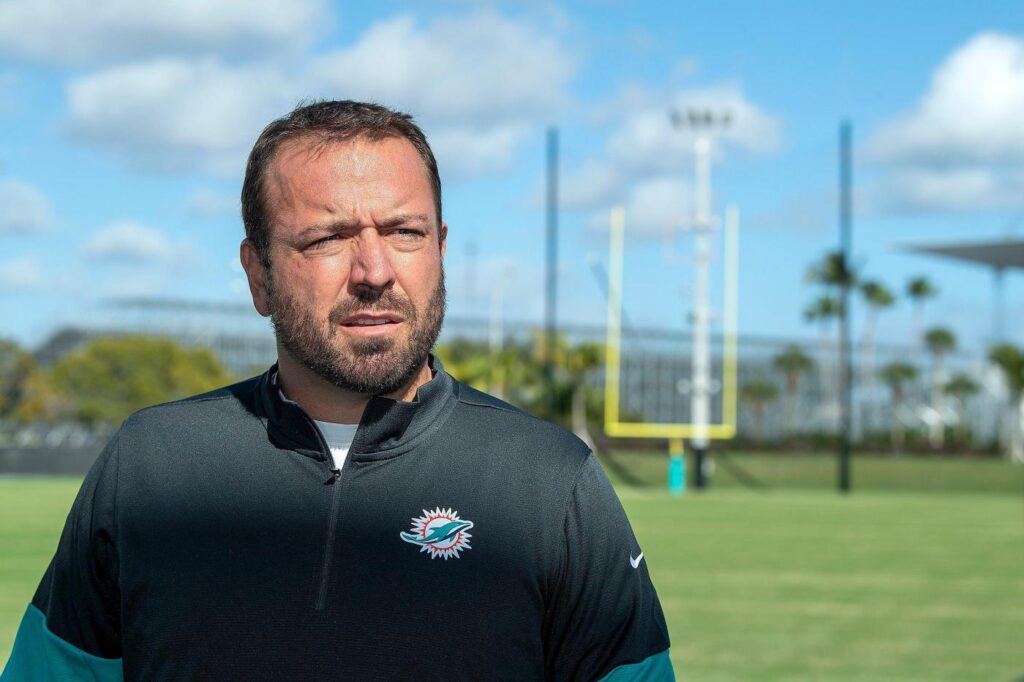
At this point in football there is more recycling, more re-purposing being done than innovation when it comes to play designs, concepts and style of play. So expecting a new coaching staff to transform a team into an offensive juggernaut overnight isn’t realistic.
That’s why Year One of Mike McDaniel’s tenure as the Miami Dolphins’ new head coach, and it’s offensive play-caller, will be more about marrying the players and their skill sets to his West Coast offensive scheme than it will be innovation.
And his task of building and installing a new offense likely won’t be as hard as it might seem considering the West Coast offense he’s learned over the years is so intertwined in the NFL’s bloodstreams that the style of play Hall of Fame coach Bill Walsh created, and made legendary is viewed as more a language than a style.
In this era of wide-open, pass-friendly, spread-concept football almost every team incorporates the rhythmic, quick throws that served as the backbone of the West Coast offense.
Even the Run-Pass-Option offense the Dolphins used for the past two seasons, the one that quarterback Tua Tagovailoa specializes in, has its foundations in the West Coast offense because of the quick passing element associated with the RPO.
That is why Miami’s new set of coaches don’t feel as if it’ll be a challenge to marry what the Dolphins were doing under Brian Flores, and what Tagovailoa has been running since his college days at Alabama, with what McDaniel intends to build when the offseason program begins this spring.
“Now a days, these guys coming up from the college game [have plenty to learn]. There are two different games we’re playing. So when those guys come up they’ve got a lot to learn,” said quarterbacks coach Darrell Bevell, who has run the West Coast offense in his four previous stints as an offensive coordinator.
“That is easier for them,” Bevell said, referring to the RPO and spread concepts that have spread like weeds at the high school and college football level. “The coaches that are up here in the NFL, we have to kind of get ourselves right with some of that stuff. The players are fine with [learning] and if you want to put some of that stuff in your offense it is seamless for them.”
But there will be an evolution, one that requires Tagovailoa and his offensive teammates to learn new plays, concepts, terminology, and develop a rhythmic timing element, which has been a staple of the West Coast offenses McDaniel learned over the years, and has helped evolve during his time as an assistant in Washington, Atlanta and San Francisco.
“I started with Mike Shanahan and immediately went to Gary Kubiak, and it’s rare to work 15 years in the NFL across six teams and have the same system. So in that, what you end up doing in the same system, you’re not constantly trying to re-learn how to do things,” McDaniel said during his introductory press conference. “You’re constantly evolving to the point where you’re at your fourth or fifth year within the offense and then you go to your third team and now you’re re-installing.”
This is the same offense that serves as foundation for Matt LaFleur in Green Bay Packers, Sean McVay with the Los Angeles Rams and Kyle Shanahan with the 49ers, and what Brandon Staley has installed with the Los Angeles Chargers and Robert Saleh is implementing with the New York Jets.
“Every single year, people call our scheme so creative but really we’re just adapting. We’re adapting to defenses. We’re adapting to our players. We’re constantly evolving. And I think that’s important and I think that’s a winning formula,” McDaniel said. “It puts players in position to succeed, and that’s the key drive for the scheme. And that’s why it’s less trying to be creative for creative’s sake. It’s more solving problems in different ways and having different tools and abilities to do so.”
The Dolphins previously ran West Coast-based offenses under Joe Philbin and Adam Gase, but neither of those units excelled or finished in the top half of the league when it came to productivity.
The hope is that McDaniel’s specialization in the run-game elements of the West Coast offense will help Miami become more balanced and doing so will improve the team’s offensive efficiency, helping the Dolphins score more points and apply more pressure on opposing defense.
But to get there a playbook has to be created, crafted, and become complementary to what these coaches know the best, and cater to 2022 roster’s various skill sets.
“We all come from different versions of the west coast. It started in San Francisco way back with Bill Walsh and the spread. Everyone has seen different versions of it and getting everyone’s take on it has been really cool,” said Frank Smith, who spent one season at the Chargers’ run-game coordinator and offensive line coach before joining the Dolphins as their offensive coordinator.
“The biggest thing is making sure we all have an understanding of the universal communication we’re going to need, and collectively coming together and teaching the guys.”
